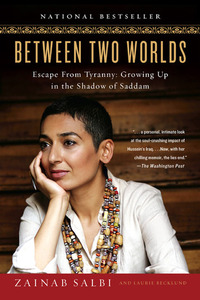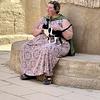Take a photo of a barcode or cover
30 reviews for:
Between Two Worlds: Escape from Tyranny: Growing Up in the Shadow of Saddam
Laurie Becklund, Zainab Salbi
30 reviews for:
Between Two Worlds: Escape from Tyranny: Growing Up in the Shadow of Saddam
Laurie Becklund, Zainab Salbi
Intense, exquisite memoir of life under Saddam. I found this after reading about her in Half the Sky. It's a good read, but be prepared to have your heart wrenched.
Excellent and inspiring book. If this doesn't inspire you, I'm not sure what will. The plight and vulnerability of women is not discussed enough. There is too much rhetoric on the governance of women's bodies and the use of women as strategic and political tactics, but not enough about empowerment and advocacy for the changes that need to take place on a GLOBAL scale. Additionally, this book is beautifully written- interweaving the memories about Saddam Hussein, her mother's memories and her own story all together in a way that is readable, passionate, heartbreaking and motivating.
This was such a very interesting read. I cannot fathom growing up and knowing a side of Saddam the rest of the world did not. Her viewpoint is so fascinating.
Wow.
Such insight from reading this book about her childhood growing up with Sadaam Hussein. She has put together an amazing organization to help women in war torn countries and I applaud her.
Such insight from reading this book about her childhood growing up with Sadaam Hussein. She has put together an amazing organization to help women in war torn countries and I applaud her.
Zainab Salbi was known growing up as “the pilot’s daughter”; her father was Saddam Hussein’s personal pilot and close friend. In Between Two Worlds, Salbi discusses growing up with Hussein as a part of her family - he was present for dinner parties, family gatherings, birthdays, and her engagement. Even though they were close to him politically, Salbi and her family struggled with how to stay away from him personally and emotionally. She shows masterfully Hussein’s communicative power and obsessive behavior over every facet of life in Iraq.
This is not a “pretty” book: it is honest and accurate, showing every part of Iraqi life under Hussein’s regime. But, nonetheless, it is one that should be read. Salbi’s discussions are ones that U.S. citizens need to hear and understand - somehow she manages to present all sides of any situation with grace and dignity. A distressing and wonderful book.
This is not a “pretty” book: it is honest and accurate, showing every part of Iraqi life under Hussein’s regime. But, nonetheless, it is one that should be read. Salbi’s discussions are ones that U.S. citizens need to hear and understand - somehow she manages to present all sides of any situation with grace and dignity. A distressing and wonderful book.
challenging
dark
emotional
informative
medium-paced
I have no idea how to process this book. It is the memoirs of a girl who grew up in Saddam Hussein's inner circle. Her first memory is of him taking a family heirloom that had no emotional meaning to him but lots to her family merely because he couldn't stand the idea of someone else having something pretty. And so it continues with Saddam's small cruelties becoming news making cruelties as she gets older and her parents can no longer hide who he is from her. Eventually Saddam starts becoming sexually interested in her and her parents marry her off to a guy from America. She divorces him but is stuck here when America closes the border to Iraq during the first gulf war. Now she's often on the news when they discuss Iraq and I've seen her twice since starting to read this book. She started an organization to help women who were raped by militaries in Kosovo and then expanding to DRC and finally expanding back to Iraq. It was interesting, and I wanted to know what happened to her but it wasn't very well written and I kept finding myself having to go back and reread things to understand what had just been said, or wondering vaguely who was referred to by a pronoun or just small writing issues, that I guess make sense for someone writing in their second language but are annoying in trying to read a book. But really I can't fault her for trying to write in English, there's much more of an audience for this book in America than there is in Arab nations. And she did much better than I would do at trying to write a book in Spanish. So there's that. Anyway, I don't think this is going to be one of the highlights of this year, but I'm glad I read it.
After Zainab Salbi had gotten together with her husband, they discussed what they would do if someone were to say to one of them, "kill this person or I'll kill your wife/husband." Salbi had been working in war zones and this wasn't just a purely academic question. They decided that at some point someone has to say "no" and made a pact that they wouldn't kill anyone, even if it meant their wife/husband would be killed or hurt.
Zainab Salbi lived through a lot of psychological damage. Her parents were forced to be friends with Saddam Hussein. It was like an abusive marriage, where people outside might ask why they didn't just leave. Part of the issue was that if her parents had taken the kids and left, their other family members would have suffered for it. Salbi had to pretend to love Saddam Hussein, to be excited to spend time with him, even when she was afraid of him. I don't think she knew as a kid that he was a murderer, but she knew he was dangerous and that expressing any kind of displeasure about him would be putting her whole family in danger.
Zainab Salbi lived through a lot of psychological damage. Her parents were forced to be friends with Saddam Hussein. It was like an abusive marriage, where people outside might ask why they didn't just leave. Part of the issue was that if her parents had taken the kids and left, their other family members would have suffered for it. Salbi had to pretend to love Saddam Hussein, to be excited to spend time with him, even when she was afraid of him. I don't think she knew as a kid that he was a murderer, but she knew he was dangerous and that expressing any kind of displeasure about him would be putting her whole family in danger.
dark
informative
reflective
medium-paced
I've been meaning to read the story of Zainab Salbi for a long time. I knew about her through the organisation she founded, Women for Women International, which helps empower women in (post) war areas rebuild their lives.
The story she tells in this book is very interesting, it gives an inside look into the Iraq of Saddam Hussain from the point of view of a family that was in his inner circle - though not of their own choosing. Zainab was a child during this time and pieced together a lot of what really happened by the time she was already out of Iraq. The origin story of Women for Women is included, good to see how that organisation came to be.
It's hard to not let my admiration of the person cloud my judgement of the book. I think it is an interesting story and definitely worth reading, but there is a bit of repetition in the book. Some parts of the story are told in a detached way, we don't always really get to see the personal impact beyond the things that happened. Still, recommended read.
The story she tells in this book is very interesting, it gives an inside look into the Iraq of Saddam Hussain from the point of view of a family that was in his inner circle - though not of their own choosing. Zainab was a child during this time and pieced together a lot of what really happened by the time she was already out of Iraq. The origin story of Women for Women is included, good to see how that organisation came to be.
It's hard to not let my admiration of the person cloud my judgement of the book. I think it is an interesting story and definitely worth reading, but there is a bit of repetition in the book. Some parts of the story are told in a detached way, we don't always really get to see the personal impact beyond the things that happened. Still, recommended read.
This is a compelling book packed full of "behind-the-scenes" of Saddam's tyranny, yet easily readable. I can't imagine the fear this family, and the rest that were Saddam's "friends", experienced. I do think the dad of the family should have taken his family out of the country to save them from the horrors they experienced. This was brought up and the father said he wouldn't do it, I personally don't feel that was being a good husband and father. I know he loved his family deeply, but he should have put them first. Fearing what would have happened to remaining extended family members is not reason to put your wife and children through the nightmare they lived.
What a blessing that Zainab was able to leave, even through difficult circumstances. Her work with other women suffering from oppression is amazing, how wonderful that she has been able to take her bad experiences and use them to aid others in desperate need of assistance.
This was a good book and I feel I learned a lot, but there seemed to be a lot of repetition and it was quite slow at times.
What a blessing that Zainab was able to leave, even through difficult circumstances. Her work with other women suffering from oppression is amazing, how wonderful that she has been able to take her bad experiences and use them to aid others in desperate need of assistance.
This was a good book and I feel I learned a lot, but there seemed to be a lot of repetition and it was quite slow at times.
Unimaginable story that brings a new perspective to life in Iraq before and during Hussein's control. Salbi's story and retrospective view of it is inspiring. What she experienced was unbelievable, but what she has chosen to do because of it is amazing. Cannot recommend her memoir more.





